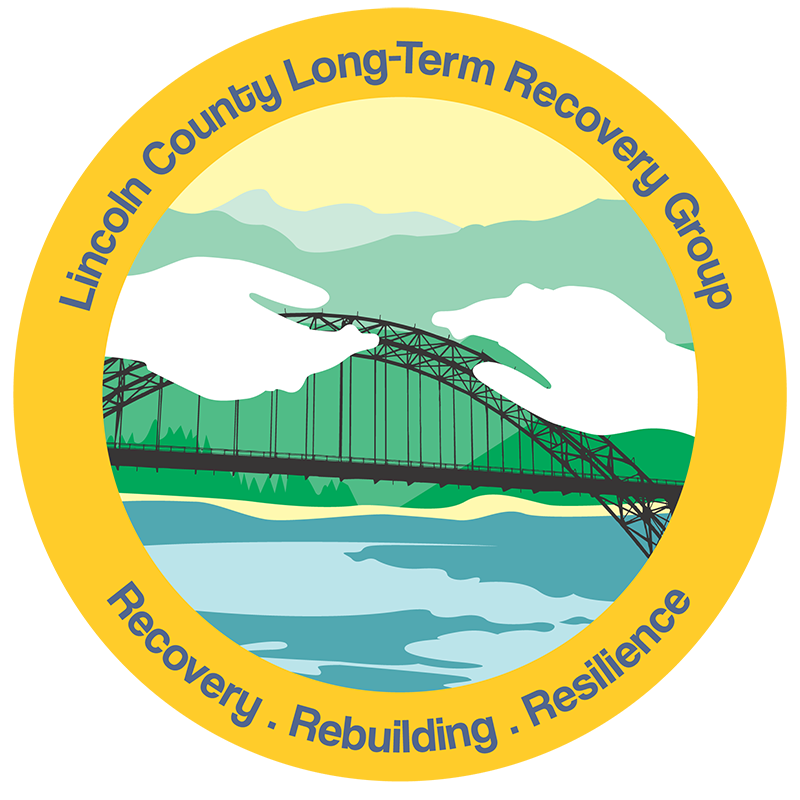About Us
Coordinating & Supporting
Our Mission
The wildfires in Otis OR that began in mid September 2020 changed the face of Lincoln County forever. The Echo Mountain Complex Fire burned 300 homes and left more than 1,200 people homeless. The impact of this disaster was unexpected and substantial, and publicity around the event was short-lived. While the fires are now behind us, there are many more challenges and obstacles that stand in our way.
Our goal is to establish recovery resources for every affected member of this community and we will leave no stone unturned until every fire survivor can rebuild their life and return home. Though we cannot undo the disaster families and individuals have experienced, we hope to help them establish a new normal for their life. We serve Survivors regardless of age, race, creed, color, gender identity, sexual orientation, disability or religious preference.
Our Priorities
The LC LTRG uses the following guidelines to determine the priorities and the actions and decisions of the LC LTRG. Primarily, it is focused on Individuals and families who need assistance to maintain or obtain safe, sanitary and secure housing, including:
- Individuals and families who are not served, or who are underserved, by other existing aid programs, including those who are ineligible for Federal Emergency Management Agency (FEMA).
- Individuals and families who are experiencing economic hardship in pursuing a plan for recovery.
- Individuals and families who are isolated or have difficulty accessing services.
- Individuals and families who have begun the recovery process but have encountered a setback and need assistance with their continued recovery.
- Individuals and families who need assistance in order to prevent deterioration in their continued recovery.
Our teams are ready to help.
LTRG Committees
Communications Committee
Having a good communications strategy is important for the success of a LTRG. A recovery group that tells a short, correct, and interesting story can make the most of opportunities to connect with donors and volunteers. Further, keeping the community informed of disaster recovery progress will also promote compassion and lower the effects of rumors or possible complaints from individuals who have not received help – often for very good reasons.
Contact: [email protected]
Construction Committee
This committee is currently forming.
This committee manages repairing or rebuilding of client homes to safe, sanitary, secure and functional conditions. This may include repairing an existing home, rebuilding a destroyed home, or relocating a home for clients that have been through the proper case management and are eligible for assistance.
Contact: [email protected]
Disaster Case Management Committee
The interaction between disaster case managers and long term recovery groups begins with this committee. By establishing clear, collaborative processes and policies as case managers begin to access financial and physical resources on behalf of their clients, the goals and priorities of the community become rooted in the process.
Contact: [email protected]
Donations Management Committee
This committee is currently forming.
Understanding donation management is another important component to every community’s recovery effort. Responders who understand their community’s needs communicate the importance of cash donations in helping to meet those needs. Responders who know how to effectively manage donated goods are more efficient at leading their community toward recovery. Effective communicators and collaborators are more successful in fulfilling needs because they invest in relationships with other responders (including local and state government) as well as the media.
Contact: [email protected]
Fundraising Committee
This committee is currently forming.
Effective fundraising committees are vital to the life and financial well-being of organizations. The function of this group focuses on information, building relationships and raising money to meet the specific organization’s special or current needs. Developing a well thought out plan with beginning and ending dates, and getting the information out to the community are important functions of the board and committee.
Contact: [email protected]
Latinx Outreach Committee
This committee is currently forming.
This committee helps educate the Latinx community about LCLTRG and the services the organization has to offer. Beyond just informing, the committee organizes and leads outreach events specifically for the Latinx community, ensuring that Latinx fire survivors, who often have been left out of government and community recovery efforts, receive aid in a direct and fair manner.
Contact: [email protected]
Spiritual and Emotional Recovery & Care Committee
Help is here. Contact the Lincoln County LTRG at [email protected]
The physical impacts of the Echo Mountain Complex Fire are obvious. Much less obvious are the spiritual and emotional impacts of the wildfires. Stresses from the loss of housing, possessions, cherished memories, employment, a sense of community, and a sense of security must be dealt with. Frequently, those one might turn to for support may be dealing with the same stressors and not be in a situation to help. The Spiritual and Emotional Care Committee was formed to help relieve this pressure. Church pastors, trained lay people, and mental health practitioners are available to assist you through these difficult times. Whenever possible, support will be aligned with your cultural and religious preferences. Our focus is on supporting YOU and helping you deal with the stressors in your life – not changing your beliefs. All conversations will be held in the strictest confidence between you and your counselor.
If you are having thoughts of hurting yourself or others,
call the 24/7 Lincoln County crisis line at 1-866-266-0288.
call the 24/7 Lincoln County crisis line at 1-866-266-0288.
Emotional and Spiritual Care Resources
- Suicide Prevention Lifeline: 1-800-273-8255 english, 1-888-628-9454 spanish
- Available Resources: Lincoln County Resource List
- Disaster Distress Helpline call or text 1-800-985-590 24/7, 365 days a year
- Lines for Life
Unmet Needs Committee
The mission of this committee is to create the Unmet Needs group, bringing together donors and casework agencies to financially assist those impacted by a disaster, provide emergency assistance, and assist victims’ long-term recovery in situations when all other means of assistance are no longer available.
Contact: [email protected]
Volunteer Committee
This committee is currently forming.
Volunteers have always been valuable and, when properly coordinated, make up an essential part of the human resources needed to respond to disasters of all types and sizes. In times of disaster, people are drawn to help their neighbors physically, spiritually, and emotionally. We believe volunteers’ skills are best used and are most effective when they volunteer as part of an established organization trained in disaster response activities. However, we realize that not all volunteers will be affiliated with an organization and trained prior to a disaster. We acknowledge that they too are a valuable resource and should receive the same level of care.
Contact: [email protected]
Our Partners
As we continue to grow and serve our community, we’re reaching out to every community group in North Lincoln County that has, at some point, been engaged in fire relief.
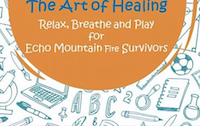
The Art of Healing
Featuring volunteers from Driftwood Public Library, the Lincoln County Community Center, and The Lincoln County Cultural Center, this group features local mental health providers, religious practitioners, and artists who offer an ongoing series of art workshops for fire survivors, each one focused on different aspects of mental and spiritual recovery. Having already hosted three art therapy workshops for adult and youth fire survivors, each of which sold out, this group plans to continue these efforts throughout the summer and into the fall.

Bob's Beach Books
North Lincoln County’s oldest independent bookseller. They have committed to providing used and new books at no or low cost to kids who lost their homes in the Echo Mountain Fire. They are also leading a project to establish a new system of tiny libraries in Otis.
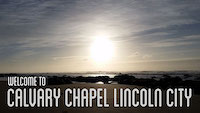
Calvary Church Lincoln City
A small congregation in Lincoln City, it is also the house of worship for several families who lost their home in the fire. They have established and maintained a furniture donation hotline and storage space where people can donate furniture and fire survivors can pick it up months, or even up to a year later, when they have a home to return to.

Cascade Relief Team
A statewide nonprofit that provides organizational and ongoing structural supports to area groups working in fire relief, in this case, the Salmon River Grange. They have established a transportation network that collects donated food from local and Willamette Valley charities and distributes it to no-cost food pantries in service of fire survivors. Additionally, they are taking a leadership role in LCLTRG’s Construction Committee.
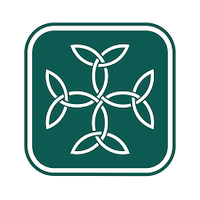
Catholic Charities of Oregon
The state sub-group of the national charity, Catholic Charities, they offer services and support to the most vulnerable Oregonians, including those impacted by the Echo Mountain Fire. This nonprofit was started by the state to hire and manage four of the six disaster case managers; they will be contributing financially to the Unmet Needs fund. Additionally, they will be joining the Unmet Needs Committee within LCLTRG.
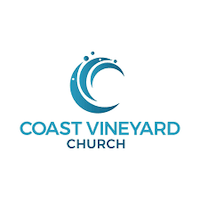
Coast Vineyard Church
A small congregation in Lincoln City that hosts the Lincoln City Food Bank and other community outreach endeavors. Additionally, they are taking a leadership role within LTRG including Co-Lead of the Spiritual/Emotional Care Committee.
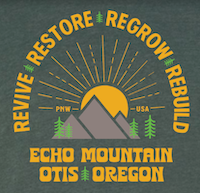
Echo Mountain Fire Relief
A nonprofit started after the Echo Mountain Fire, they were the first on-the-ground nonprofit to respond to immediate needs, as well as fundraising for long-term relief in service of the LCLTRG. Since the fire, they have raised nearly $100,000 for fire survivors, which includes a donation of $20,000 to the volunteer-led on-mountain clean-up. They are also a newly certified contractor with the state and will be providing funding for wrap-around services. Additionally, they are taking a leadership role in LCLTRG’s communications, fundraising and Latinx outreach committees, as well as financial support of LCLTRG’s Latinx as well as Spiritual and Emotional outreach programming.

Habitat for Humanity of Lincoln County
The local affiliate of Habitat International, Habitat for Humanity of Lincoln County (HFHLC) provided financial support for early debris removal efforts and the coordination of services for survivors. HFHLC is currently pursuing other grants to fund construction needs approved through the Lincoln County LTRG Unmet Needs Committee. Additionally, their members have taken on leadership roles within the LTRG, including president, and the interim head of the Unmet Needs Committee.
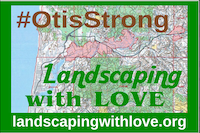
Landscaping with Love
A local volunteer group established after the echo-mountain fire to help replant areas where the Echo Mountain Fire burned. At this time, they have already secured thousands of donated trees, plants, and other native vegetation to give for free to fire survivors. They also secured donations of equipment such as wheelbarrows, gardening and lawn care tools, and the materials needed to create both a greenhouse and dozens of planter boxes. They are committed to continuing these services through at least late 2022.
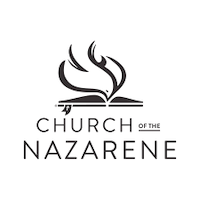
LC Church of the Nazarene
A local church that has a history of food and physical donations to area residents, after the otis fires they have made special efforts to reach out to fire survivors. Their assistance has included meeting many different needs of fire survivors, helping them purchase everything from gasoline, to special-diet foods to appliances.

Lincoln City Cultural Center
A local non-profit hub for artists of all kinds, they are the physical and spiritual home of the arts community in North Lincoln County. In the weeks and months after the fire, LCCC hosted online auctions of donated goods to help replace the tools that local artists lost in the fire, such as paintbrushes and paint, sculpting tools, etc. They also hosted a gallery showing off pieces created by fire survivors, with all admissions fees going to funding more replacement of artists’ tools. They will receive some direct funds from this grant to continue that effort in conjunction with the LCLTRG Unmet Needs Committee.
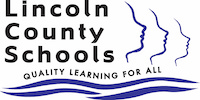
Lincoln County School District
The local school district where 80 different students who lost their homes in the fire attend. Along with providing direct educational and mental health supports to both students and faculty members who lost their homes in the fire, they have worked with both local and state governments to make the needs assessment process for students simpler. In the future, they will be hosting community events for at least the next year focused on the ongoing mental health recovery of students who survived the fire.

North End Senior Solutions
A local nonprofit dedicated to providing improvement of the lives of local seniors, they have been offering direct services to fill immediate needs to approximately 40 unique fire survivor families since the fire. They plan to continue this outreach in the coming year at a similar level.
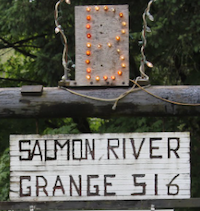
The Salmon River Grange
A century-old community service organization that opened a community relief center for fire victims the week after the fire - and has not closed since, save for holidays. The Grange has been informally called “The World’s Smallest Super-Walmart for Fire Survivors - and everything is free.” Providers of food and other material goods, such as clothes and toiletries, they offer a variety of services, too. These include mental health counseling three days a week through Lincoln County’s CORE mental health outreach program, as well as access to showers, laundry, and bus transportation at no cost. Servicing approximately 200 unique families, they are committed to continuing these services through at least late 2022.
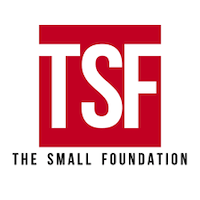
The Small Foundation
A new nonprofit established after the Echo Mountain Fire that works both independently and collaboratively with local construction companies, plumbers, and electric companies to help fire survivors rebuild their property’s at a lower cost than might otherwise be possible. Having already spent 155 days straight volunteering on Echo Mountain, Ty and Melynda Small remain committed to helping their neighbors return home, which is why they will be working with the Unmet Needs Committee to arrange for the repair of septics, water systems, and electrical services on individual properties. They will receive some direct funds from this grant to continue that effort in conjunction with the LCLTRG Unmet Needs Committee. Additionally, they have agreed to take a leadership role within the LCLTRG Construction Committee.
We work in partnership with our fiscal agent, Catholic Charities of Oregon, to garner resources and deliver services to Lincoln County disaster survivors.

